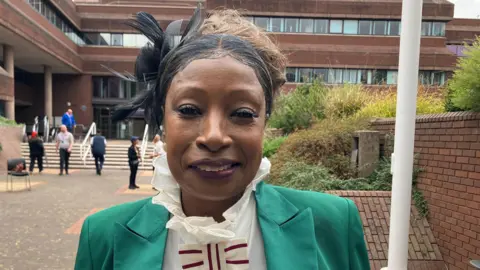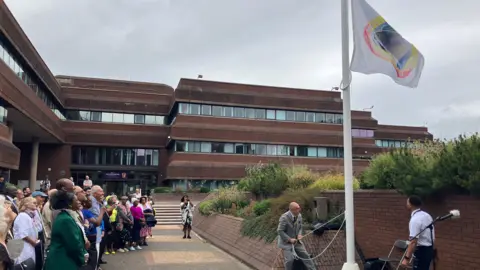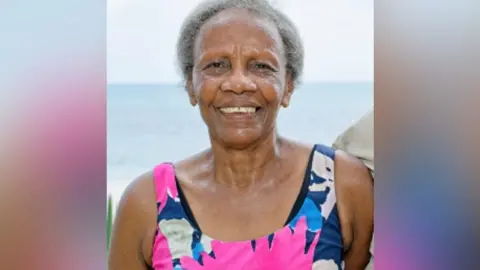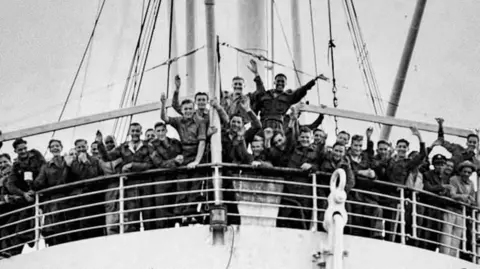'We stand on the shoulders of Windrush pioneers'
 BBC
BBCThe Windrush flag has been raised in Wolverhampton and a bronze bust was being unveiled of a black woman who made history in the city.
The events were to mark Windrush Day, which marks the contributions of the Windrush generation - people from the Caribbean who were invited to the UK to help rebuild post-war Britain.
The first ship, HMT Empire Windrush, docked in Tilbury, Essex, in 1948, with hundreds of passengers on board.
After the flag-raising ceremony at the Civic Centre, Sandra Samuels, Deputy Lieutenant of the West Midlands and former Wolverhampton mayor, said it was about saying "thank you", adding: "We are standing on the shoulders of our Windrush pioneers."
The bust being unveiled at the art gallery has been created by sculptor Hannah Northam and shows Mel Chevannes, who was elected as Wolverhampton's first African-Caribbean councillor in 1981.
Many of the Windrush community had helped to build infrastructure, especially in Wolverhampton, Ms Samuels said.
"Windrush generation paved the way for a lot of us," she added.
Ms Samuels, whose father was among the Windrush generation, is co-founder of the Heritage Centre in Wolverhampton, was the first black mayor of the city, has worked for community organisations and is a retired NHS manager and theatre sister.
She said nothing held her back and achievements in life were about "self-belief and support" that people had.
"It's the black community that has actually jollied me along and made sure that I'm there to try and make a difference."

City council papers said Prof Chevannes was not only Wolverhampton's first black councillor but also the first black female university professor.
Speaking to BBC Radio WM, Prof Chevannes said she was humbled at the honour, but hoped it would show others what is possible.
"Never mind the obstacles, never mind people picking on you because of your colouring or your skin or your gender, find other people who are supportive and work around it," she said.
Wolverhampton MP Sureena Brackenridge said in the Commons Prof Chevannes had "not only opened doors but shattered glass ceilings".
 Wolverhampton City Council
Wolverhampton City CouncilProf Chevannes said the Windrush generation had "overcome tremendous obstacles, more so than I and many others have experienced, and if it hadn't been for them, we wouldn't be here".
She said: "These were the people who experienced racial discrimination at first hand, couldn't get housing accommodation – they literally shared beds.
"I know things have changed, but nevertheless there are still people who are treated very badly on the basis of their colour. No-one should be treated badly because of the colouring of their skin."
 PA Media
PA MediaIn 1981, The Times reported how Chevannes held the Graiseley ward for Labour with 1,887 votes, beating Roger Steel, from the newly-formed Social Democratic Party – a group that had broken away from Labour – with 1,114.
Remembering how she had Caribbean, Asian and white supporters, she said she had been the first black woman to stand in the ward.
It had been seen as an "easy capture" for the new party, Prof Chevannes said, but added: "It didn't happen and in fact people were really wonderful."
She described how as chair of the social services committee, she worked to help young people, families and people facing difficulties.
She served as a councillor for 11 years and later chaired The Royal Wolverhampton NHS Trust.
Her statue is the first in England to honour a named black woman still living, Prof Chevannes said.
A statue of Jamaican-born Mary Seacole was believed to be the UK's first in honour of a named black woman in 2016.
Seacole, who nursed soldiers in the Crimean War, died in 1881.
Follow BBC Wolverhampton & Black Country on BBC Sounds, Facebook, X and Instagram.
